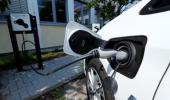Having established its presence in the country, luxury carmaker Lexus is now looking to chart its next phase of growth in India as it looks to consolidate sales network and drive in new models, including fully electric cars in the country, according to a top company official.

The company, which is the luxury car arm of Japanese auto major Toyota, initiated operations in India in 2017 and currently sells seven models in the country, including the locally-produced ES 300h sedan.
Known for its self charging hybrid cars, the company is now gearing up to drive in battery electric vehicles, besides ramping up its existing product portfolio in the market.
In an interaction with PTI, Lexus India President Naveen Soni noted that the company is now at the cusp of sustainable growth phase in the country.
He stated that the luxury automaker is currently evaluating its model UX with full battery electric configuration in order to ascertain its performance in the Indian climatic conditions.
After conducting the trials, which would mainly ascertain the impact of heat and dust on the functioning of the battery, the company may seriously consider launching the model in the country, Soni said.
"Globally, Lexus has given a direction that they would like to electrify, that is battery electric by 2035.
"That is the mission given by our head office. Now given this fact, we have to move into this journey, transition into this journey," he stated.
Soni noted that in the future as the charging infrastructure grows, the company would be getting more and more ready towards battery electric vehicles.
"To start the journey, we have brought in few battery electric vehicles (UX) from Japan...We are currently conducting customer acceptance trials and testings for the vehicle because our country has extreme climates and has heat and dust which has an impact on battery charge holding capacity over a period of time," he stated.
He further said, "So we have to do these trials and testings. Once we are through with those trials we will take necessary next steps of looking at those products more seriously and transiting into battery electric domain."
On other new models which the company is planning to launch in the near future, Soni said: "We are looking at newer models specially the LX which has been a runaway success in Japan...We are looking at getting that car very soon into the country and we would be announcing bookings etc very soon."
On network expansion plans, he stated that the automaker plans to open three more sales outlets at Chennai, Cochin and Chandigarh over the next two months, taking the total number of its guest experience centres to seven across the country.
"With these seven guest experience centres we will be covering 56 per cent of the luxury car market," Soni said.
Elaborating more on the strategy, he said that the company has also carefully selected around 12 cities where it would like to open Lexus service points (LSPs).
These LSPs will be providing service to customers outside the cities where it already has brand set ups, Soni said.
"This would give confidence to customers to experience Lexus in a better way.
"Plus, we are also looking at three or four locations where we would like to set up brand experience centres.
"With these 12 LSPs I think our coverage will become 93 per cent of the luxury car market in the country.
"So from 56 to 93 per cent is the journey which we intend to undertake this year," he added.
He further said: "In addition to this, somewhere down the year we will be announcing online purchase portal also so that would enable the customers to order Lexus from anywhere."
When asked if the company would look at assembling more products locally, Soni said the only challenge in transitioning from CBU (completely built unit) to CKD was the business sustainability issue.
"We need to secure certain minimum volumes otherwise the vendor which is supporting in terms of localisation will not be able to offer competitive prices for the quality and the kind of technical requirements which we have..so we are always looking at growing volumes to a level where it becomes sustainable for us to be able to provide a good product to the consumer at a competitive price," he added.
The company is continuously scanning the scenario but there are various miles to cross before it reaches that level, Soni said.
He stated that the domestic luxury car segment was showing a rebound.
"The growth which we are witnessing today in the luxury car segment, it gives us confidence that it might be back even before what we had been imagining.
"This year, I think, if everything goes well it could be back to 32,000-35,000 units per annum.
"If that happens then obviously there is more space and elbow room for everyone to grow," Soni noted.
The luxury car industry in India was peaking in 2018 with around 40,000 units a year but came down to 20,000 units in the next two years due to the Covid-19 related disruptions, he stated.











 © 2025
© 2025